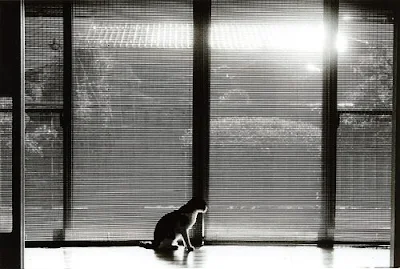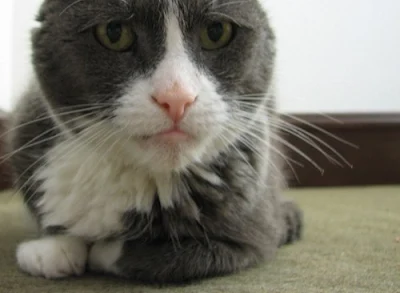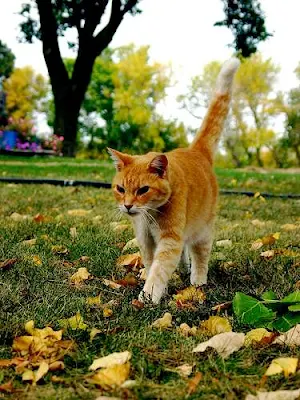
Senior cat care - Old cat - photograph copyright junku-newcleus under creative commons license kindly granted by the photographer. The name is his Flickr name.
My cat is a fighting fit but slightly fat 15-16 year female Tuxedo Moggie of great distinction. She is built like a brick and sh*t* (excuse the language) like a trooper, a sure sign that she is healthy. You can learn quite a lot about the health of your cat companion cleaning the litter. Senior Cat Care is something I know a bit about from first hand experience.
But seriously for a minute it can be quite worrying living with an older cat. We know that their average life span is around the late teens. Mind you some breeders of purebred cats think the late teens is unattainable. If fed and cared for properly it is certainly attainable. As a cat nears the end of their lives it gets hard for human and cat alike. Mentally I am (or indeed have) prepared for my cats death and I feel sad when a think of it, very sad as I will miss her terribly.
It is good to know that generally cats like humans are living longer. That means a need for greater awareness of the needs of the older cat to allow for proper Senior Cat Care.

Senior Cat Care - Old Cat - photograph copyright emdot and reproduced under creative commons license.
So what are the special needs of the older cat? The needs stem from the changes that take place in a cat as she gets older. An older cat will be less flexible, and if she is overweight that is an obstacle to flexibility too. As a result, her grooming is less effective and parts of her body may not be groomed. These parts are the difficult areas to get too such as the lower back and hind quarters. The best way around this is to give your senior cat daily grooming sessions. Maybe even twice or three times a day for shortish sessions.
This is great for several reasons. Your cat will like it, usually, and if she doesn't there may be something wrong physically. A vet's check up could be in order. So, she'll like it. You'll like it. It will slow you down for a bit. It will allow you to get closer to your cat. And it will allow you to inspect her while grooming to check for symptoms that give an indication of an illness. As cats get older their immune systems become less effective (I can vouch for that in terms of my health!) so it is wise to watch out for signs of illness.
You don't have to be a veterinarian to recognize if something looks wrong as it is usually common sense. The hard part is deciding what is wrong. We leave that to the vet of course. So senior cat care can have a silver lining.
Older senior cats have less elastic skin and stiff or arthritic joints. The skin's blood circulation is less effective leaving the cat more open to infection. The arthritic or stiff joints might mean a change to some of the practices that you have in place for the placement of the litter and the food. My cat has difficulty climbing onto my bed so I am about to build some steps. She also has greater difficulty using the cat flap so I have to open the door for her. I think that these little things should be observed and acted upon especially if you are not around a lot to deal with them on an ad hoc basis.

Old cat photograph copyright Terry Bain and reproduced under a creative commons license.
Senior cat care should extend to a routine inspection of her teeth. Dental disease is fairly common in senior cats in part due to the food we give them. Dry cat food is not the answer. Not only are diseases of the gums and teeth bad per se they also make eating less enjoyable and sometimes difficult. This may lead to a loss of appetite and weight loss. A sore mouth due to gum disease needs treatment obviously.
Loss of appetite may also be due to a partial loss of smell as we all know that cats decide what to eat by the smell of the food. Good cat food is, I think, hard to come by. I would argue, on the basis of having read Elizabeth Hodgkins book, "Your Cat", that dry cat food is not as good as wet. I cover these aspects at the cat food section of the cat facts page of the main website..
The things that affect us in old age affect cats to such as loss of memory ("senior moments") and personality change (grumpy - I can empathise).
I think it important for all cats but particularly senior cats that stress levels are reduced as much as possible. Cats like routine so allowing a well run-in routine to continue wherever possible is a big plus for a older cat.
One obviously important part of Senior Cat Care is exercise (and that applies to us both). Older cats sleep more and sometimes eat more. Obese cats are on the increase. This is our responsibility although sometimes it can be difficult to deal with. I make an effort (but it is relatively easy for me as I am retired) to play with my girl on the lawn perhaps a couple of times a day for say 10 mins at least. She loves it. She asks me to do it and I can check up on her condition such as breathing and general muscle tone and joints when playing with her. She passes on all fronts at present thankfully.
This post does not cover all the "angles". See your vet for the truly medical stuff.
Sources:
- Cornell University College of Veterinary Medicine
- Myself
Senior Cat Care to Home Page

Thanks for your comments about old cats. I have two 13 year old tabbies, and I've watched them start to slow down. I want to do everything I can to make sure that their lives are as long and healthy as possible.
ReplyDeleteI've found supplements (like fish oil) have helped their arthritis. During the winter they stayed plastered against the heating vent. Now that days are warmer, when I'm home, I turn a heating pad on low for them. Often they both cuddle up there together.
oops - forgot to leave my own blog name...
ReplyDeletePeggy
ReplyDeleteThanks for the fish oil tip.